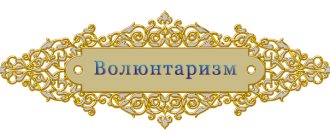What is erudition?
Erudition (from the Latin ēruditio - learning, enlightenment) - comprehensive education, broad knowledge in many areas.
This term refers to the ability of the human mind to absorb and retain in memory a large amount of information and knowledge in a variety of areas.
Erudition as a personality quality is a unique ability to demonstrate information awareness, erudition, informativeness, orderliness and structure in a wide range of knowledge and deep knowledge in the field of one’s life activity, resulting from education, systematic study and comprehension of various literary and information sources.
The meaning of the word "erudition"
- ERUDITY, -i, f. Deep, thorough knowledge of smb. fields of knowledge, diverse education. (Small Academic Dictionary, MAS)
Erroneous interpretation of erudition
Many people confuse the concept of erudition and wisdom. But these are completely different definitions. An erudite person, not always wise and “enlightened.” Erudition is nothing more than a simply structured, ordered set of knowledge. Erudition is characteristic of people with a good memory and curiosity.
However, simply reading or hearing information and remembering it is not enough to become an erudite person. It is necessary to consciously “digest” this knowledge, subject it to criticism, compare it with other sources, test it in practice, making sure of its truth. And only then apply it in your life and pass it on to others. To use information in this way requires a high degree of intelligence.
Erudition and broad outlook.
The deep knowledge of an erudite only reflects the fact that a person is intensively studying some area. This knowledge is not necessary or vital on a daily basis and in itself has no practical benefit. But the general outlook is the information that we use every day. Having a general outlook really makes life easier and helps you apply your knowledge in action.
Erudition and lively mind.
As Socrates said: “Knowledge is not intelligence” - it is not difficult for an ordinary “cramming” person to gather information and remember it. After all, he can simply remember a lot of data without understanding its content. But to analyze what you read and draw your own conclusions - alas. Automatic erudition sometimes “clutters” the brain so much that meaningful answers are lost and the excitement of the researcher is dulled.
Erudition and memory.
Erudition depends on the ability to memorize and memory capacity. But the winner is not the one who theoretically knows more, but the one who quickly retrieves the necessary information from memory.
Ideally, an erudite person is one who has all these abilities equally developed. But mental abilities are similar to physical ones - you can train your biceps hard to win in arm wrestling, or you can train a little of everything to be a healthy person.
Who is an erudite person
Let's consider the main question - what is an erudite person? Smart, developed, well-read, educated?
Erudition definitely has something to do with being an educated person. However, this is not the same thing, contrary to the prevailing opinion among society. An erudite person is necessarily educated, but an educated person is not always an erudite.
The main difference is that not all educated people strive to expand and supplement their knowledge, or test it through their own experience. Many blindly take on faith what they were taught in schools, institutes and other educational institutions, and never question this knowledge.
And a truly erudite person always strives to overcome his ignorance and replenish himself with new knowledge. He explores topics and areas of life that interest him, drawing knowledge from all kinds of sources. Any information is subject to analysis and criticism. If an erudite questions some fact or received information, he will definitely research and check them in order to come to his own conclusion. Also, erudites are able to consider certain knowledge, fact, situation from different points of view, without considering any of them to be the only correct one.
Such a person has deeper knowledge in some areas (science, philosophy, history, medicine) than just a good specialist or holder of a higher education.
Erudition, intelligence, intelligence - what are the differences?
Erudition presupposes extensive knowledge about something. But it is one thing to be a “walking library,” but quite another to be able to apply your knowledge in action. Erudition without practical application is an opportunity to show off your intellect or memory on occasion and nothing more. Moreover, false erudition goes hand in hand with pride, narcissism, self-satisfaction, and vanity. And this is already a negative quality. Erudition does not automatically qualify one as a genius. But there are cases when such a superpower may even be a sign of mental deviation. There is a disorder called “Savant syndrome,” a condition in which a person suddenly develops knowledge in one or more areas. Such “islands of genius” appear in some narrow area. For example, savants remember all the works of Shakespeare by heart or can draw a detailed map of the streets of an unfamiliar city from memory. Outwardly, they differ little from those around them, but communication and socialization are difficult for them. Indeed, we will never need most of the memorized information, and erudition itself brings little benefit - someone who gives the impression of a sage thanks to encyclopedic knowledge may be completely unable to solve simple life problems. Another disadvantage of “naked” erudition is the lack of critical thinking. While absorbing information from different sources, a person is simply unable to assess their reliability. But this does not mean that you need to abandon memory or logic training - it is worth distinguishing between similar erudition concepts:
Five signs of an intelligent person
Even if an intelligent person is an erudite, he does not consider this his main advantage. He always knows that he has room to strive to become even better. He does not boast of his erudition and achievements. He does not try to assert himself at the expense of less erudite people.
Education and erudition: the relationship between concepts
An educated person can be an erudite, but education does not always imply broad and deep erudition. For example, there is a design engineer, and he knows everything about his work, but is almost not interested in anything other than it, because the rest of the world has nothing to do with him. Who can say that a design engineer is a dark and uneducated person? Nobody. However, he can hardly be called an erudite.
So what is erudition? This is broad awareness of different areas of knowledge. As we have already understood, erudition can be deep and shallow. The main feature is that it is developed by a person independently, through self-education, i.e. reading books. Erudition and erudition are almost synonymous.
If we leave aside people who write (writers, journalists and philologists), for whom bookish education serves as a necessary tool for work, then in other cases, an erudite is an ascetic of non-utilitarian knowledge, which, perhaps, he does not need at all in everyday activities. Reading books and automatically gaining erudition is just a way to dilute the prose of life.
Rounding out the topic of education and erudition, it must be said: a person with an education is not always an erudite, but an erudite is always an educated person.
Advantages of an erudite person
Without a doubt, developed erudition is an advantage. Let’s look at exactly what advantages such an interesting personality trait provides in life:
- An erudite person feels comfortable in any company. He can support almost any conversation, surprise others with his knowledge, and tell people interesting information.
- He has a better chance of getting a well-paid job and moving up the career ladder.
- If necessary, scholars can easily learn a new profession and change their work activity.
- They are attracted to erudites; many of them have a penchant for leadership and managerial qualities.
- A person has the ability to handle large amounts of information.
- Such people have a higher level of cognitive abilities and a reduced risk of developing senile dementia and Alzheimer's disease.
- An erudite person arouses increased interest from other people and enjoys success with the opposite sex.
- It is easier for erudite people to make new acquaintances and business connections.
- Erudites are more trusted, especially in professional circles.
- Erudite people are more confident and have high self-esteem, which allows them to achieve success in life.
- Smart and developed children grow up in a family of erudites, as their parents pass on their extensive knowledge to them and easily answer any questions.
As you can see, erudition has many advantages, and these are factors that many people should strive for.
Interesting facts about our memory abilities:
Fact 1
Memory and its properties directly depend on a person’s profession. It really is better among announcers, teachers, scientists, and actors. After all, these people have to memorize a large amount of text, constantly repeat it and learn something new.
Fact 2
In fact, a person remembers not what happened to him in objective reality, but his subjective assessments - negative or positive impressions, which can be influenced by any little thing. For example, the whole day could go like a fairy tale, and at the end an event happened that spoiled the mood. Rest assured, a person will remember exactly this, painting his whole day in black colors
Fact 3
There are two types of memory - short-term, or operational, and long-term. During a session, students manage to “push” a huge amount of information into their memory overnight, which disappears immediately after the exam. Patients with so-called senile forgetfulness remember in great detail events that happened in early childhood or many years ago, but are unable to retain in their heads what happened half an hour ago.
False erudition and its disadvantages
An erudite person is not always reasonable and consistent with his knowledge. If an individual simply has a good memory and a high speed of assimilation of information, he can memorize it. But all knowledge will remain only surfaces. Such a person is capable of spouting clever phrases, quotes from great scientists and philosophers, but at the same time will not understand their essence.
A person can be extremely erudite, but throughout his entire life he will never acquire fundamental, spiritual knowledge about his purpose, the meaning of existence, the science of living correctly according to the laws of the Universe. Such erudition is considered false.
What is the use if a person knows everything about a culture, but behaves badly himself. Or he has extensive knowledge in the field of medicine and a healthy lifestyle, but he himself will not cure diseases.
Such imaginary scholars will continue to make certain mistakes, step on the same rake, relearn the same type of life lessons, build false goals, be disappointed and suffer.
Erudition that does not extend to one’s own life, knowledge that is not applied in practice, rattles like an empty barrel - there is a lot of noise, but there is no sense.
O.G. Torsunov said in one of his lectures: “The development of the mind in itself does not mean anything. A person can know a lot, but understand little. Purity of mind is the more important factor. A person may be erudite, but he does nothing of what is right, so such a person cannot be considered intelligent.”
False erudition is often mixed with pride. Such a person becomes vain, prone to narcissism and greedy for praise. It seems to him that he is smarter than others, and, definitely, this makes him better, higher than others. Such individuals love to argue and impose their point of view on everyone. In fact, a false erudite is simply a stupid and unreasonable person with a good memory.
Now you know who an erudite person is and how to become one yourself. Develop, learn, discover and discover new things. It was not for nothing that the ancient sages believed that the stupidest person is the one who is sure that he knows everything. Life continues as long as you are passionately interested in it and try to know it in all aspects.
How to become an erudite person on your own
Is it possible to develop erudition on your own? This survey is of interest to many who want to engage in self-development. Experts in the field of psychology and personal growth say that this is quite possible. Human abilities are unlimited and everyone can “pump” themselves to any desired level.
The concept of what an erudite person should know is very subjective. This can be knowledge in a specific area, but covering it as much as possible, or in different areas. The main thing is that it is interesting to the owner of the information.
So, tips on how to develop erudition yourself:
- Read more books. These should not be romance novels and detective stories, but popular science literature, books from the field of philosophy, self-knowledge, and history. Educational textbooks are also excellent sources of useful information.
- Don't blindly believe everything that comes into your mind. Subject information to doubt, criticism and analysis. This is the only way you can be convinced of the reliability of certain knowledge.
- Cultivate your curiosity. Be interested in the new and unknown. The wider your range of interests, the more interesting you are.
- Choose your environment. It’s not for nothing that there is a saying “whoever you mess with...”. More often be in the company of erudite, educated, successful, wise people who have something to learn from.
- Attend educational and cultural events. Go to exhibitions, museums, theaters, classical music concerts, scientific conferences.
- Watch science documentaries.
- If you are passionate about a topic, area, subject, study it in all its depth and breadth, and not just superficially.
- Travel, get acquainted with the culture of other countries.
- Enrich your speech, learn new terms and words.
- Don’t just learn and memorize information, but reflect on it, form your own vision and point of view.
- Avoid destructive, useless information that flows today in huge quantities from everywhere and fills people’s heads (yellow press, negative news, advertising, propaganda of certain images and forms of behavior).
- Develop your intellectual abilities: learn foreign languages, learn to play chess, learn poetry, solve crossword puzzles.
- Make friends with similar interests and communicate, exchange information.
Listen to themed podcasts
It is ideal, when you are busy with any physical work, to turn on thematic podcasts in the background that may be of interest to you. Firstly, this does not require active involvement from you - you can mind your own business and at the same time learn a lot of new and interesting things. Secondly, it saves time: you don’t have to cut down on your leisure time or your favorite hobby to listen to a podcast.
Force yourself to understand a topic that you don’t understand at all.
For example, if in school you couldn’t understand physics or you had certain difficulties with literature, you can make up for everything now. So what if it may never be useful to you in life, because your work has nothing to do with definitions from physics or the characters of the heroes of Russian classics. You do this not because it is necessary, but in order to become more erudite and upgrade yourself. Believe me, someday your knowledge will be useful to you. And no one is immune from a sudden change of job or acquisition of a new hobby.
Train your brain to remember information
The easiest way to do this is by memorizing poems or songs, but the most useful thing is to learn words from a foreign language. Firstly, this way you can improve your knowledge, and secondly, your memory will receive regular training.
Get rid of the habit of postponing everything until later
For example, if you have long dreamed of joining a gym or starting doing exercises in the morning, then start supporting yourself in acquiring healthy habits today. There is no opportunity to go to the gym, arrange physical training at home. Order sports equipment, allocate some space in your apartment to do physical exercise. And most importantly, make your workouts regular. This will help you become more responsible and disciplined in implementing your plans. Download an app to track your progress, hang a calendar with your class schedule on your refrigerator, and get going!
Buy interesting benefits
It's time to resume the habit of reading books, especially since it does not require you to have a lot of free time. Psychology, sexology, biology - it’s always useful to know a little more about how your body works, etc. Download books, read them online or order a paper version through online stores - whichever you prefer. Believe me, as soon as you begin to learn something completely new to you, something that you previously considered unimportant or completely useless, many facts will be revealed to you that you will hear about for the first time. On occasion, you can even show off your knowledge in a certain area.
Start learning a new language
If you haven’t gotten along with English or German since school, it doesn’t matter. There are many other languages in the world. Maybe you have long dreamed of living in Finland for a while - try to learn at least a few words and expressions in Finnish. Or, if you are afraid that you are not able to learn a foreign language from scratch, take a closer look at the group of Slavic languages. Croatian, Polish, Bulgarian, Belarusian, Ukrainian, Czech - they are all similar to Russian. By the way, when learning a language from this group, you will be able to cheer yourself up, because some familiar words will sound very funny in translation.
Get a developing hobby
Or maybe you like to do puzzles in your free time or draw, even though you don’t believe that your awkward attempts will lead to something great. You can start with color by number books or watch tutorial videos and after some time you will see progress. In any case, remember that a hobby exists so that you can relax and have fun.
Width and depth of erudition
As always, let's start with the definition. And here everything is not as simple as it seems at first glance. Because erudition can be understood as both broad, but shallow knowledge, and deep education, when a person understands the subject comprehensively. The meaning of the word “erudition,” like any other, depends on the context. Yes, it is also important to remember that the depth of any knowledge is relative.
How to Raise Broad Awareness
The general level of awareness is directly influenced by your social circle. The more time a person spends in contact with others, the more information he learns, and its assimilation is much easier than if he were forced to read the same facts. However, if you surround yourself only with artists, you get a set of approximately the same topics and events. Therefore, it is necessary to strive to be surrounded by various people with multifaceted interests, and of course their level of knowledge in any topic should be higher than your own.
An important point in any development is interest, and regarding erudition, it plays a paramount role. It is impossible to remember information that is both not needed for work and not interesting personally. Therefore, even when choosing a topic that is not entirely clear and interesting for study, it is worth organizing the entire process in advance in such a way as to periodically tone up passion. An interesting company that will not allow you to abandon training or a system of self-reward for achieving certain levels is perfect for this.
Choose a hobby instead of watching TV in the evening. In order for free time activities to be beneficial, you need to create a certain approach. For example, learning a language will have a greater impact on the development of general erudition if you directly communicate with people from different countries, via Skype or other programs, than just learning a dictionary. Collecting, which involves learning the history of each thing or the culture of the country where it was made, turns the accumulation of things into a developing personal process.
The facts that a person learns must be shared and discussed with friends, especially if there are disagreements and controversy arises. The brain is designed in such a way that the more we explain to others the structure of something, the more we ourselves begin to understand what we share.
It is also useful to consider any new information from different angles - this is what develops broad opportunities for knowledge. For example, having learned about the structure of a technical device, you can fill in the gaps regarding who invented it and when, and then study the biography of this person. Any new information brings with it new opportunities for study - the main thing is to notice them and criticize them.
The more critical your thinking is, the broader your horizons become. Not to take it for granted, but to look for why it is so, not to learn a theorem, but to watch its proof - expands awareness and makes life more interesting.
How to increase erudition?
It is impossible to become well-read on purpose, but the main thing here is to start. Cultivate at least one fiery passion in your soul. Everyone can have their own. There is no point in giving examples here. The main thing is to be interested in something with all your heart. Impatient readers will ask: “Is it possible to increase erudition?” Answer: Yes. But only if a person loves knowledge disinterestedly, and not in order to achieve extraneous goals.
For example, a teenager wants to please girls, so with sickening scrupulousness he studies the immortal creations of Paulo Coelho in order to talk about something with the young ladies, or rather, to start a conversation, of course, a casual one. It’s unlikely that anything will come of such erudition. Because a person is not possessed by a passion for knowledge.
So, erudition rests on three pillars:
- Love for development.
- Love of reading.
- The love of learning without any purpose.
The last point needs clarification. If knowledge has a specific goal, then sooner or later it will exhaust itself, and an erudite is a person who absorbs knowledge for pleasure. Erudition is a kind of intellectual hedonism. This last fact is important to remember.








